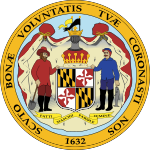| |||||||||||||||||||
95 delegates to the Democratic National Convention (68 pledged, 27 unpledged) The number of pledged delegates received is determined by the popular vote | |||||||||||||||||||
|---|---|---|---|---|---|---|---|---|---|---|---|---|---|---|---|---|---|---|---|
| |||||||||||||||||||
 Primary results by county Gore: 50–55% 55–60% 60–65% 65–70% 70–75% 75–80% 80–85% | |||||||||||||||||||
| Elections in Maryland |
|---|
 |
|
|
| Pledged national convention delegates | |
|---|---|
| Type | Del. |
| CD1 | 5 |
| CD2 | 5 |
| CD3 | 6 |
| CD4 | 7 |
| CD5 | 5 |
| CD6 | 4 |
| CD7 | 6 |
| CD8 | 6 |
| PLEO | 9 |
| At-large | 15 |
| Total pledged delegates | 68 |
The 2000 Maryland Democratic presidential primary took place on March 7, 2000, as one of 16 contests scheduled on Super Tuesday in the Democratic Party primaries for the U.S. 2000 presidential election. The Maryland primary was a closed primary, with the state awarding 95 delegates to the 2000 Democratic National Convention, of whom 68 were pledged delegates allocated on the basis of the primary results.
Vice president Al Gore won the primary with 67% of the vote. Senator Bill Bradley, who would withdraw in the days following from the presidential race but still competed for delegates, and reached only less than 28%, one of his lowest results so far in the race. The remaining 4% were separated between Lyndon LaRouche Jr. and the "uncommitted" option.

